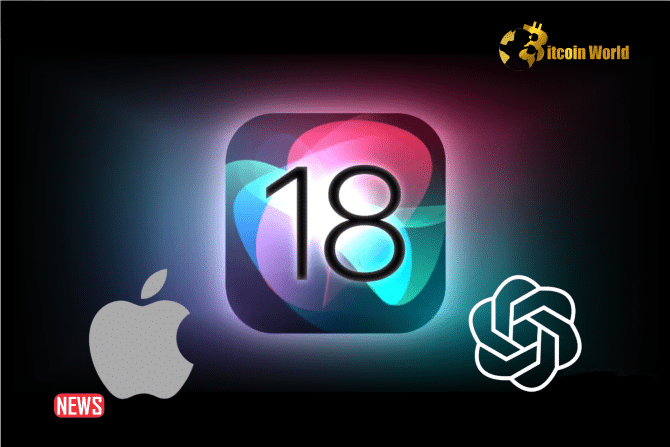The tech world is buzzing with whispers of a potential power couple in the making: Apple and OpenAI! Imagine your iPhone, already a powerhouse of innovation, getting a significant AI upgrade, potentially fueled by none other than ChatGPT. Yes, you heard that right! Reports are surfacing that Apple is deep in discussions with OpenAI to bring ChatGPT’s magic to your beloved iPhones with the upcoming iOS 18 update.
Apple and OpenAI: A Potential AI Powerhouse Partnership?
According to a recent Bloomberg report, Apple is actively exploring the integration of OpenAI’s cutting-edge AI technology to supercharge features in the next iPhone operating system, iOS 18. This news comes hot on the heels of earlier reports suggesting Apple was also in talks with Google about leveraging their Gemini AI model. It seems Apple is leaving no stone unturned in its quest to deliver a truly intelligent iPhone experience.
This dual-track discussion highlights a critical juncture in the AI race. Landing a deal with Apple would be a monumental win for either OpenAI or Google, instantly catapulting them to a dominant position in the rapidly evolving AI landscape. Think about it: millions of iPhones worldwide, potentially powered by their AI – the implications are massive!
Why Now? Apple’s AI Urgency and iOS 18
The timing of these discussions is particularly noteworthy. Apple’s Worldwide Developers Conference (WWDC), the stage where Apple typically unveils its latest software innovations, is just around the corner – roughly six weeks away. Expectations are sky-high for Apple to showcase a suite of new generative AI features baked into iOS 18. This push underscores Apple’s urgency to catch up and potentially leap ahead in the AI race.
See Also: Google Says No ‘straight Line’ Between Generative AI And Unemployment — For Now
While Apple is reportedly developing its own in-house AI capabilities for iOS 18, the reality is that they are facing stiff competition and are perceived to be playing catch-up. The tech giant is in a race against time to deliver AI experiences that can rival, or even surpass, what’s already available from competitors.
The AI Dilemma: Build In-House or Partner Up?
Apple’s interest in both OpenAI and Google signals a strategic decision point: should they rely solely on their internal AI development, or should they partner with established AI powerhouses? As the Bloomberg report suggests, a final decision is yet to be made. Let’s weigh the pros and cons:
- Building In-house AI:
- Pros: Full control over technology, data privacy, seamless integration with Apple ecosystem, potential for unique and differentiated AI experiences.
- Cons: Time-consuming and resource-intensive development, risk of falling behind competitors, potential for slower innovation in a rapidly evolving field.
- Partnering with OpenAI or Google:
- Pros: Access to proven and powerful AI models (like ChatGPT and Gemini), faster time-to-market for AI features, leveraging external expertise and innovation.
- Cons: Reliance on a third-party, potential data privacy concerns, less control over AI development roadmap, risk of becoming dependent on a competitor’s technology.
Apple’s AI Catch-Up Game: Why the Urgency?
For much of 2023, Apple remained relatively quiet on the AI front, while companies like OpenAI and Google were making headlines with groundbreaking advancements. Now, in mid-2024, Apple is expected to unveil its first major generative AI offerings. In the fast-paced world of AI, this indeed positions Apple as a late entrant.
Reports indicate that Apple’s internal attempts to develop a ChatGPT-like chatbot, reportedly codenamed “Apple GPT,” have fallen short of expectations. Employees have allegedly described it as inferior to leading models currently available. This internal struggle likely fueled Apple’s decision to refocus its AI efforts and explore external partnerships.
Mitigating AI Launch Risks: Learning from Others
By potentially outsourcing its AI to companies like Google or OpenAI, Apple could strategically sidestep some of the pitfalls and public missteps encountered by ChatGPT and Gemini during their initial launches. Remember Gemini’s AI image generator controversies or early inaccuracies in ChatGPT? Apple could leverage the maturity and lessons learned from these existing platforms.
However, this approach also presents a double-edged sword. Becoming reliant on a competitor for core AI technology could create dependencies and potentially limit Apple’s long-term innovation and control in this crucial domain.
The Stakes for OpenAI and Google: A Battle for AI Supremacy
An Apple partnership is a golden ticket in the AI arena. For OpenAI, winning this deal would be transformative. Imagine ChatGPT powering iPhones globally, adding to its existing partnership with Microsoft. This could solidify OpenAI’s dominance as the go-to AI provider, a true AI superpower.
For Google, securing the Apple contract could be a significant redemption arc for Gemini. After a somewhat rocky and criticized debut, a partnership with Apple would inject renewed confidence in Gemini’s capabilities and showcase its potential to a massive user base.
The Road Ahead: What to Expect
As we approach WWDC and the anticipated launch of iOS 18, the tech world will be watching closely to see who Apple chooses as its AI partner, or if they opt for a hybrid approach. The decision will not only shape the future of iPhones but also significantly influence the trajectory of the AI industry itself.
Will your next iPhone conversation be powered by ChatGPT? Or will Google Gemini be the brains behind Siri’s enhanced intelligence? One thing is certain: the AI revolution is coming to your pocket, and Apple is determined to be a key player.
#Binance #WRITE2EARN
Disclaimer: The information provided is not trading advice, Bitcoinworld.co.in holds no liability for any investments made based on the information provided on this page. We strongly recommend independent research and/or consultation with a qualified professional before making any investment decisions.


